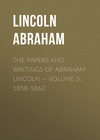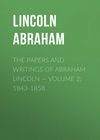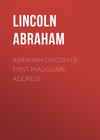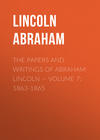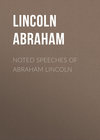Read the book: «The Papers And Writings Of Abraham Lincoln — Volume 5: 1858-1862», page 13
SOME FORTS SURRENDERED TO THE SOUTH
TO E. B. WASHBURNE
(Confidential)
SPRINGFIELD, ILLINOIS, December 21, 1860
HON. E. B. WASHBURNE.
MY DEAR SIR: — Last night I received your letter giving an account of your interview with General Scott, and for which I thank you. Please present my respects to the General, and tell him, confidentially, I shall be obliged to him to be as well prepared as he can to either hold or retake the forts, as the case may require, at and after the inauguration.
Yours as ever,
A. LINCOLN.
TO A. H. STEPHENS
(For your own eye only) SPRINGFIELD, ILLINOIS, DECEMBER 22, 1860
HON. ALEXANDER STEVENS
MY DEAR SIR: — Your obliging answer to my short note is just received, and for which please accept my thanks. I fully appreciate the present peril the country is in, and the weight of responsibility on me. Do the people of the South really entertain fear that a Republican administration would, directly or indirectly, interfere with the slaves, or with them about the slaves? If they do, I wish to assure you, as once a friend, and still, I hope, not an enemy, that there is no cause for such fears. The South would be in no more danger in this respect than it was in the days of Washington. I suppose, however, this does not meet the case. You think slavery is right and ought to be extended, while we think it is wrong and ought to be restricted. That, I suppose, is the rub. It certainly is the only substantial difference between us.
Yours very truly,
A. LINCOLN.
SUPPORT OF THE FUGITIVE SLAVE CLAUSE
MEMORANDUM
December [22?], 1860
Resolved: That the fugitive slave clause of the Constitution ought to be enforced by a law of Congress, with efficient provisions for that object, not obliging private persons to assist in its execution, but punishing all who resist it, and with the usual safeguards to liberty, securing free men against being surrendered as slaves.
That all State laws, if there be such, really or apparently in conflict with such law of Congress, ought to be repealed; and no opposition to the execution of such law of Congress ought to be made.
That the Federal Union must be preserved.
Prepared for the consideration of the Republican members of the Senate Committee of Thirteen.
TO D. HUNTER
(Confidential.)
SPRINGFIELD, ILLINOIS December 22, 1860
MAJOR DAVID HUNTER.
MY DEAR SIR: — I am much obliged by the receipt of yours of the 18th. The most we can do now is to watch events, and be as well prepared as possible for any turn things may take. If the forts fall, my judgment is that they are to be retaken. When I shall determine definitely my time of starting to Washington, I will notify you.
Yours truly,
A. LINCOLN.
TO I. N. MORRIS
(Confidential.)
SPRINGFIELD, ILL., Dec 24, 1860
HON. I. N. MORRIS.
MY DEAR SIR: — Without supposing that you and I are any nearer together, politically, than heretofore, allow me to tender you my sincere thanks for your Union resolution, expressive of views upon which we never were, and, I trust, never will be at variance.
Yours very truly,
A. LINCOLN.
ATTEMPT TO FORM A COALITION CABINET
TO HANNIBAL HAMLIN
SPRINGFIELD, ILLINOIS, December 14, 1860.
HON. HANNIBAL HAMLIN.
MY DEAR SIR: — I need a man of Democratic antecedents from New England. I cannot get a fair share of that element in without. This stands in the way of Mr. Adams. I think of Governor Banks, Mr. Welles, and Mr. Tuck. Which of them do the New England delegation prefer? Or shall I decide for myself?
Yours as ever,
A. LINCOLN.
1861
TO WILLIAM H. SEWARD.
(Private.)
SPRINGFIELD. ILL., January 3, 1861.
HON. W. H. SEWARD.
DEAR SIR: — Yours without signature was received last night. I have been considering your suggestions as to my reaching Washington somewhat earlier than is usual. It seems to me the inauguration is not the most dangerous point for us. Our adversaries have us now clearly at disadvantage on the second Wednesday of February, when the votes should be officially counted. If the two houses refuse to meet at all, or meet without a quorum of each, where shall we be? I do not think that this counting is constitutionally essential to the election, but how are we to proceed in the absence of it? In view of this, I think it is best for me not to attempt appearing in Washington till the result of that ceremony is known.
It certainly would be of some advantage if you could know who are to be at the heads of the War and Navy departments, but until I can ascertain definitely whether I can get any suitable men from the South, and who, and how many, I can not well decide. As yet, I have no word from Mr. Gilmer in answer to my request for an interview with him. I look for something on the subject, through you, before long.
Yours very truly,
A. LINCOLN.
TO W. H. SEWARD
(Private.)
SPRINGFIELD, ILL., January 12, 1861
HON. W. H. SEWARD.
MY DEAR SIR: — Yours of the 8th received. I still hope Mr. Gilmer will, on a fair understanding with us, consent to take a place in the Cabinet. The preference for him over Mr. Hunt or Mr. Gentry is that, up to date — he has a living position in the South, while they have not. He is only better than Winter Davis in that he is farther south. I fear, if we could get, we could not safely take more than one such man — that is, not more than one who opposed us in the election — the danger being to lose the confidence of our own friends. Your selection for the State Department having become public, I am happy to find scarcely any objection to it. I shall have trouble with every other Northern Cabinet appointment — so much so that I shall have to defer them as long as possible to avoid being teased into insanity, to make changes.
Your obedient servant,
A. LINCOLN
TO E. D. MORGAN
SPRINGFIELD, ILL. FEB. 4, 1861
SIR: — Your letter of the 30th ult. inviting me, on behalf of the Legislature of New York, to pass through that State on my way to Washington, and tendering me the hospitalities of her authorities and people, has been duly received. With the feelings of deep gratitude to you and them for this testimonial of regard and esteem I beg you to notify them that I accept the invitation so kindly tendered.
Your obedient servant,
A. LINCOLN
P.S. — Please let the ceremonies be only such as to take the least time possible. A. L.
PATRONAGE CLAIMS
TO THURLOW WEED
SPRINGFIELD, ILL., February 4, 1861
DEAR SIR: — I have both your letter to myself and that to Judge Davis, in relation to a certain gentleman in your State claiming to dispense patronage in my name, and also to be authorized to use my name to advance the chances of Mr. Greeley for an election to the United States Senate.
It is very strange that such things should be said by any one. The gentleman you mention did speak to me of Mr. Greeley in connection with the senatorial election, and I replied in terms of kindness toward Mr. Greeley, which I really feel, but always with an expressed protest that my name must not be used in the senatorial election in favor of or against any one. Any other representation of me is a misrepresentation.
As to the matter of dispensing patronage, it perhaps will surprise you to learn that I have information that you claim to have my authority to arrange that matter in New York. I do not believe you have so claimed; but still so some men say. On that subject you know all I have said to you is "justice to all," and I have said nothing more particular to any one. I say this to reassure you that I have not changed my position.
In the hope, however, that you will not use my name in the matter, I am,
Yours truly,
A. LINCOLN.
FAREWELL ADDRESS AT SPRINGFIELD, ILLINOIS,
FEBRUARY 11, 1861
MY FRIENDS: — One who has never been placed in a like position cannot understand my feelings at this hour, nor the oppressive sadness I feel at this parting. For more than twenty-five years I have lived among you, and during all that time I have received nothing but kindness at your hands. Here the most cherished ties of earth were assumed. Here my children were born, and here one of them lies buried. To you, my friends, I owe all that I have, all that I am. All the strange checkered past seems to crowd upon my mind. To-day I leave you. I go to assume a task more difficult than that which devolved upon General Washington. Unless the great God who assisted him shall be with and aid me I cannot prevail; but if the same almighty arm that directed and protected him shall guide and support me I shall not fail; I shall succeed. Let us pray that the God of our fathers may not forsake us now. To Him I commend you all. Permit me to ask that with equal sincerity and faith you will all invoke His wisdom and goodness for me.
With these words I must leave you; for how long I know not. Friends, one and all, I must now wish you an affectionate farewell.
REMARKS AT TOLONO, ILLINOIS, FEBRUARY 11, 1861
I am leaving you on an errand of national importance, attended, as you are aware, with considerable difficulties. Let us believe, as some poet has expressed it, "Behind the cloud the sun is still shining." I bid you an affectionate farewell.
REPLY TO ADDRESS OF WELCOME, INDIANAPOLIS,
INDIANA, FEBRUARY 11, 1861
GOVERNOR MORTON AND FELLOW CITIZENS OF THE STATE OF INDIANA:
Most heartily do I thank you for this magnificent reception, and while I cannot take to myself any share of the compliment thus paid, more than that which pertains to a mere instrument, an accidental instrument, perhaps I should say, of a great cause, I yet must look upon it as a most magnificent reception, and as such most heartily do thank you for it. You have been pleased to address yourself to me chiefly in behalf of this glorious Union in which we live, in all of which you have my hearty sympathy, and, as far as may be within my power, will have, one and inseparable, my hearty consideration. While I do not expect, upon this occasion, or until I get to Washington, to attempt any lengthy speech, I will only say to the salvation of the Union there needs but one single thing — the hearts of a people like yours.
The people — when they rise in mass in behalf of the Union and the liberties of their country, truly may it be said, "The gates of hell cannot prevail against them." In all trying positions in which I shall be placed — and, doubtless, I shall be placed in many such — my reliance will be placed upon you and the people of the United States; and I wish you to remember, now and forever, that it is your business, and not mine; that if the union of these States and the liberties of this people shall be lost, it is but little to any one man of fifty-two years of age, but a great deal to the thirty millions of people who inhabit these United States, and to their posterity in all coming time. It is your business to rise up and preserve the Union and liberty for yourselves, and not for me.
I desire they should be constitutionally performed. I, as already intimated, am but an accidental instrument, temporary, and to serve but for a limited time; and I appeal to you again to constantly bear in mind that with you, and not with politicians, not with Presidents, not with office-seekers, but with you is the question, Shall the Union and shall the liberties of this country be preserved to the latest generations?
ADDRESS TO THE LEGISLATURE OF INDIANA, AT INDIANAPOLIS,
FEBRUARY 12, 1861
FELLOW-CITIZENS OF THE STATE OF INDIANA: — I am here to thank you much for this magnificent welcome, and still more for the generous support given by your State to that political cause which I think is the true and just cause of the whole country and the whole world.
Solomon says there is "a time to keep silence," and when men wrangle by the mouth with no certainty that they mean the same thing while using the same word, it perhaps were as well if they would keep silence.
The words "coercion" and "invasion" are much used in these days, and often with some temper and hot blood. Let us make sure, if we can, the meaning of those who use them. Let us get the exact definitions of these words, not from dictionaries, but from the men themselves, who certainly deprecate the things they would represent by the use of the words.
What, then, is coercion? What is invasion? Would the marching of an army into South Carolina, without the consent of her people, and with hostile intent toward them, be invasion? I certainly think it would, and it would be coercion also, if the South Carolinians were forced to submit. But if the United States should merely hold and retake its own forts and other property, and collect the duties on foreign importations, or even withhold the mails from places where they were habitually violated, would any or all of these things be invasion or coercion? Do our professed lovers of the Union, who spitefully resolve that they will resist coercion and invasion, understand that such things as these, on the part of the United States, would be coercion or invasion of a State? If so, their idea of means to preserve the object of their great affection would seem to be exceedingly thin and airy. If sick, the little pills of the homoeopathist would be much too large for it to swallow. In their view, the Union, as a family relation, would seem to be no regular marriage, but rather a sort of "free-love" arrangement, to be maintained on passional attraction.
By the way, in what consists the special sacredness of a State? I speak not of the position assigned to a State in the Union by the Constitution, for that is a bond we all recognize. That position, however, a State cannot carry out of the Union with it. I speak of that assumed primary right of a State to rule all which is less than itself, and to ruin all which is larger than itself. If a State and a county, in a given case, should be equal in number of inhabitants, in what, as a matter of principle, is the State better than the county? Would an exchange of name be an exchange of rights? Upon what principle, upon what rightful principle, may a State, being no more than one fiftieth part of the nation in soil and population, break up the nation, and then coerce a proportionably large subdivision of itself in the most arbitrary way? What mysterious right to play tyrant is conferred on a district of country, with its people, by merely calling it a State? Fellow-citizens, I am not asserting anything. I am merely asking questions for you to consider. And now allow me to bid you farewell.
INTENTIONS TOWARD THE SOUTH
ADDRESS TO THE MAYOR AND CITIZENS OF
CINCINNATI, OHIO, FEBRUARY 12, 1861
Mr. MAYOR, AND GENTLEMEN: — Twenty-four hours ago, at the capital of Indiana, I said to myself, "I have never seen so many people assembled together in winter weather." I am no longer able to say that. But it is what might reasonably have been expected — that this great city of Cincinnati would thus acquit herself on such an occasion. My friends, I am entirely overwhelmed by the magnificence of the reception which has been given, I will not say to me, but to the President-elect of the United States of America. Most heartily do I thank you, one and all, for it.
I have spoken but once before this in Cincinnati. That was a year previous to the late Presidential election. On that occasion, in a playful manner, but with sincere words, I addressed much of what I said to the Kentuckians. I gave my opinion that we, as Republicans, would ultimately beat them as Democrats, but that they could postpone that result longer by nominating Senator Douglas for the Presidency than they could by any other way. They did not, in any true sense of the word, nominate Mr. Douglas, and the result has come certainly as soon as ever I expected. I also told them how I expected they would be treated after they should have been beaten, and I now wish to call their attention to what I then said upon that subject. I then said:
"When we do as we say, beat you, you perhaps want to know what we will do with you. I will tell you, as far as I am authorized to speak for the Opposition, what we mean to do with you. We mean to treat you, as near as we possibly can, as Washington, Jefferson, and Madison treated you. We mean to leave you alone, and in no way to interfere with your institutions; to abide by all and every compromise of the Constitution, and, in a word, coming back to the original proposition, to treat you so far as degenerate men, if we have degenerated, may, according to the example of those noble fathers, Washington, Jefferson, and Madison.
"We mean to remember that you are as good as we; that there is no difference between us other than the difference of circumstances. We mean to recognize and bear in mind always that you have as good hearts in your bosoms as other people, or as we claim to have, and treat you accordingly."
Fellow-citizens of Kentucky — friends and brethren, may I call you in my new position? — I see no occasion and feel no inclination to retract a word of this. If it shall not be made good, be assured the fault shall not be mine.
ADDRESS TO THE GERMAN CLUB OF CINCINNATI, OHIO,
FEBRUARY 12, 1861
Mr. CHAIRMAN: — I thank you and those whom you represent for the compliment you have paid me by tendering me this address. In so far as there is an allusion to our present national difficulties, which expresses, as you have said, the views of the gentlemen present, I shall have to beg pardon for not entering fully upon the questions which the address you have now read suggests.
I deem it my duty — a duty which I owe to my constituents — to you, gentlemen, that I should wait until the last moment for a development of the present national difficulties before I express myself decidedly as to what course I shall pursue. I hope, then, not to be false to anything that you have expected of me.
I agree with you, Mr. Chairman, that the working men are the basis of all governments, for the plain reason that they are all the more numerous, and as you added that those were the sentiments of the gentlemen present, representing not only the working class, but citizens of other callings than those of the mechanic, I am happy to concur with you in these sentiments, not only of the native-born citizens, but also of the Germans and foreigners from other countries.
Mr. Chairman, I hold that while man exists it is his duty to improve not only his own condition, but to assist in ameliorating the condition of mankind; and therefore, without entering upon the details of the question, I will simply say that I am for those means which will give the greatest good to the greatest number.
In regard to the Homestead law, I have to say that, in so far as the government lands can be disposed of, I am in favor of cutting up the wild lands into parcels, so that every poor man may have a home.
In regard to the Germans and foreigners, I esteem them no better than other people, nor any worse. It is not my nature, when I see a people borne down by the weight of their shackles — the oppression of tyranny — to make their life more bitter by heaping upon them greater burdens; but rather would I do all in my power to raise the yoke than to add anything that would tend to crush them.
Inasmuch as our own country is extensive and new, and the countries of Europe are densely populated, if there are any abroad who desire to make this the land of their adoption, it is not in my heart to throw aught in their way to prevent them from coming to the United States.
Mr. Chairman and gentlemen, I will bid you an affectionate farewell.
